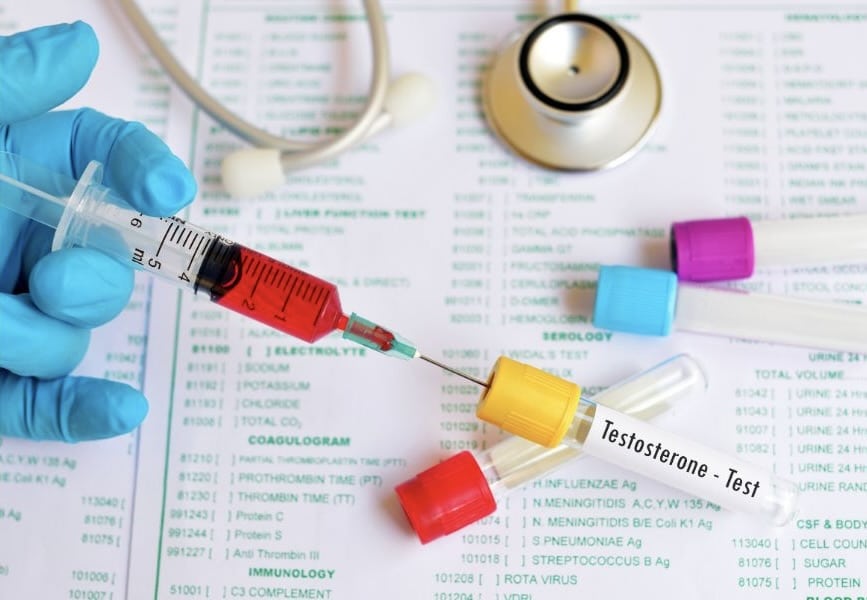Is Gynecomastia Hormonal Imbalance Related?
Written by: Dr. Dahlia Rice. Posted in: Blog

When it comes to gynecomastia hormonal imbalance issues are the number one cause. For most patients, the core issue comes down to an imbalance of testosterone (a predominantly male hormone) and estrogen (a predominantly female hormone).
Table of Contents
ToggleWhat Is Gynecomastia?
Gynecomastia is the presence of enlarged male breast tissue, also known as “breast swelling” in men. One or both breasts may be affected.
Male breast enlargement is typically benign and not a sign of breast cancer or anything very serious. Instead, it may be simply the side effect of a medication. Some men develop gynecomastia because they’ve taken anabolic steroids.
Depending on the cause, gynecomastia can simply be the presence of excess fatty tissue in the breasts. In other cases, it’s actual breast tissue growth, meaning that atypical glandular proliferation is occurring. In this case, the hormones testosterone and estrogen are usually to blame in some way.
Finally, gynecomastia may sometimes be related to excess skin. Men who go through a period of massive weight loss may find that their skin can’t “keep up with” their body fat loss, leaving it stretched out once they’ve reached their goal weight.
Most notably, this condition can cause a lot of embarrassment for the individual, who may find it hard to find clothes they like, be shirtless in public, or feel comfortable in intimate situations.
Can Hormone Imbalance Cause Gynecomastia?

Breast development is controlled by estrogen levels. Therefore, if a man observes swollen breast tissue, the cause is often either an estrogen excess or lowered free testosterone secretion.
At the same time, there are other reasons why gynecomastia might develop as well. Other hormones such as luteinizing hormone or human chorionic gonadotropin may play a role.
If a direct hormonal imbalance cannot be found, the following is a list of the most typical reasons for developing gynecomastia:
Pubertal Gynecomastia
When a young man is going through puberty, gynecomastia is a normal side effect. Most of the time, it goes away on its own as hormone levels even out. However, if a male has persistent pubertal gynecomastia that carries on past puberty, they are at an increased risk to develop enlarged breasts long-term.
Gynecomastia Related to Illicit Drugs
Use of meth, heroin, anabolic steroids, and other illegal drugs has been linked to gynecomastia. Incidentally, heavy use of marijuana and alcohol has also been positively correlated with gynecomastia symptoms.
Gynecomastia Related to Medications
Taking certain medications such as calcium channel blockers, antibiotics, antidepressants, and cancer drugs may also be related to gynecomastia in adults.
Gynecomastia Related to Illness
Kidney failure, prostate cancer, cancer of the pituitary gland, apparent primary testicular failure, chronic liver disease, thyroid disease, and other illnesses can all cause gynecomastia. Essentially, if you have a disease that causes hormonal imbalance gynecomastia may develop.
Idiopathic Gynecomastia
Unfortunately, in many cases, gynecomastia appears for an unknown cause. This is called idiopathic gynecomastia.
How Can You Treat Gynecomastia?
The most common way to treat gynecomastia is with gynecomastia surgery. This cosmetic procedure involves the administration of anesthesia, placing incisions around the treatment area, removing excess glandular tissue, skin, and fat from the breast to reduce breast size, and carefully closing the incisions.
Gynecomastia can also sometimes be treated with lifestyle changes. For example, if your gynecomastia is caused by taking a certain medication or using a certain type of illicit drug, cessation of these medications or drugs should stop the gynecomastia from developing and may reverse it.
FAQ: Gynecomastia
 What hormonal imbalance causes enlarged breasts?
What hormonal imbalance causes enlarged breasts?
There are two hormones that are usually the cause of a hormonal imbalance that leads to gynecomastia. These hormones are estrogen and testosterone. Generally speaking, estrogen is a female hormone, and testosterone is a male hormone.
However, both men and women actually possess both of these hormones. Because estrogen is a hormone that is in charge of breast growth in both men and women, if a man develops too much estrogen, this could cause the breast tissue to grow abnormally large. Likewise, a reduction in testosterone in men could cause the same outcome.
Is gynecomastia surgery painful?
The surgery itself will be performed with the use of anesthesia, so you should feel no pain. Afterward, soreness in the treatment area is to be expected, but pain medications will be prescribed to ease any discomfort.
How much is gynecomastia surgery?
Gynecomastia surgery cost can be low or high depending on the type of surgical treatment you need, the city and state where you get surgery, what type of anesthesia is used, and other factors. If you want to know how much your surgery should cost, please call to book a consultation appointment with Dr. Rice.
Call Our Office to Book a Consultation
Board certified plastic surgeon Dr. Dahlia Rice performs gynecomastia surgery at her Chicago practice.
Dr. Rice and her team understand that gynecomastia can be a very delicate subject for men. It’s difficult to go through life feeling constantly self-conscious about having enlarged breast tissue, and it can cause a range of problems that don’t need to be there.
Fortunately, gynecomastia surgery is a commonly performed, highly effective surgery that treats gynecomastia. Most patients who undergo this procedure wonder why they waited so long.
If you would like to learn more about gynecomastia surgery with Dr. Dahlia Rice in Chicago, please call our office today to schedule a consultation appointment.
References
https://www.mayoclinic.org/diseases-conditions/gynecomastia/symptoms-causes/syc-20351793
 What hormonal imbalance causes enlarged breasts?
What hormonal imbalance causes enlarged breasts?